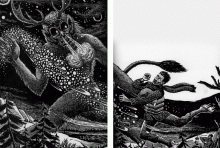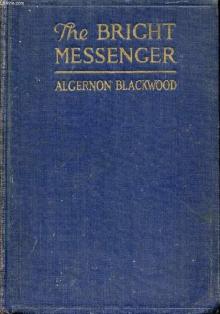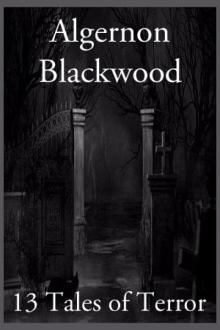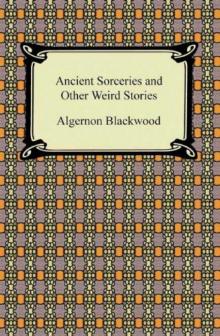- Home
- Algernon Blackwood
Day and Night Stories Page 3
Day and Night Stories Read online
Page 3
III
THE WINGS OF HORUS
Binovitch had the bird in him somewhere: in his features, certainly,with his piercing eye and hawk-like nose; in his movements, withhis quick way of flitting, hopping, darting; in the way he perchedon the edge of a chair; in the manner he pecked at his food; in histwittering, high-pitched voice as well; and, above all, in his mind.He skimmed all subjects and picked their heart out neatly, as a birdskims lawn or air to snatch its prey. He had the bird's-eye view ofeverything. He loved birds and understood them instinctively; couldimitate their whistling notes with astonishing accuracy. Their onequality he had not was poise and balance. He was a nervous little man;he was neurasthenic. And he was in Egypt by doctor's orders.
Such imaginative, unnecessary ideas he had! Such uncommon beliefs!
"The old Egyptians," he said laughingly, yet with a touch of solemnconviction in his manner, "were a great people. Their consciousness wasdifferent from ours. The bird idea, for instance, conveyed a sense ofdeity to them--of bird deity, that is: they had sacred birds--hawks,ibis, and so forth--and worshipped them." And he put his tongue out asthough to say with challenge, "Ha, ha!"
"They also worshipped cats and crocodiles and cows," grinned Palazov.Binovitch seemed to dart across the table at his adversary. His eyesflashed; his nose pecked the air. Almost one could imagine the beatingof his angry wings.
"Because everything alive," he half screamed, "was a symbol of somespiritual power to them. Your mind is as literal as a dictionary andas incoherent. Pages of ink without connected meaning! Verb always inthe infinitive! If you were an old Egyptian, you--you"--he flashed andspluttered, his tongue shot out again, his keen eyes blazed--"you mighttake all those words and spin them into a great interpretation of life,a cosmic romance, as they did. Instead, you get the bitter, dead tasteof ink in your mouth, and spit it over us like that"--he made a quickmovement of his whole body as a bird that shakes itself--"in emptyphrases."
Khilkoff ordered another bottle of champagne, while Vera, his sister,said half nervously, "Let's go for a drive; it's moonlight." Therewas enthusiasm at once. Another of the party called the head waiterand told him to pack food and drink in baskets. It was only eleveno'clock. They would drive out into the desert, have a meal at two inthe morning, tell stories, sing, and see the dawn.
It was in one of those cosmopolitan hotels in Egypt which attract theordinary tourists as well as those who are doing a "cure," and allthese Russians were ill with one thing or another. All were orderedout for their health, and all were the despair of their doctors. Theywere as unmanageable as a bazaar and as incoherent. Excess and bed weretheir routine. They lived, but none of them got better. Equally, noneof them got angry. They talked in this strange personal way without ashred of malice or offence. The English, French, and Germans in thehotel watched them with remote amazement, referring to them as "thatRussian lot." Their energy was elemental. They never stopped. Theymerely disappeared when the pace became too fast, then reappeared againafter a day or two, and resumed their "living" as before. Binovitch,despite his neurasthenia, was the life of the party. He was also aspecial patient of Dr. Plitzinger, the famous psychiatrist, who tooka peculiar interest in his case. It was not surprising. Binovitch wasa man of unusual ability and of genuine, deep culture. But there wassomething more about him that stimulated curiosity. There was thisstriking originality. He said and did surprising things.
"I could fly if I wanted to," he said once when the airmen came toastonish the natives with their biplanes over the desert, "but withoutall that machinery and noise. It's only a question of believing andunderstanding----"
"Show us!" they cried. "Let's see you fly!"
"He's got it! He's off again! One of his impossible moments."
These occasions when Binovitch let himself go always proved wildlyentertaining. He said monstrously incredible things as though hereally did believe them. They loved his madness, for it gave them newsensations.
"It's only levitation, after all, this flying," he exclaimed, shootingout his tongue between the words, as his habit was when excited; "andwhat is levitation but a power of the air? None of you can hang anorange in space for a second, with all your scientific knowledge; butthe moon is always levitated perfectly. And the stars. D'you think theyswing on wires? What raised the enormous stones of ancient Egypt? D'youreally believe it was heaped-up sand and ropes and clumsy leverageand all our weary and laborious mechanical contrivances? Bah! It waslevitation. It was the powers of the air. Believe in those powers,and gravity becomes a mere nursery trick--true where it is, but truenowhere else. To know the fourth dimension is to step out of a lockedroom and appear instantly on the roof or in another country altogether.To know the powers of the air, similarly, is to annihilate what youcall weight--and fly."
"Show us, show us!" they cried, roaring with delighted laughter.
"It's a question of belief," he repeated, his tongue appearing anddisappearing like a pointed shadow. "It's in the heart; the power ofthe air gets into your whole being. Why should I show you? Why should Iask my deity to persuade your scoffing little minds by any miracle? Forit is deity, I tell you, and nothing else. I _know_ it. Follow one idealike that, as I follow my bird idea--follow it with the impetus andundeviating concentration of a projectile--and you arrive at power. Youknow deity--the bird idea of deity, that is. _They_ knew that. The oldEgyptians knew it."
"Oh, show us, show us!" they shouted impatiently, wearied of hisnonsense-talk. "Get up and fly! Levitate yourself, as they did! Becomea star!"
Binovitch turned suddenly very pale, and an odd light shone in his keenbrown eyes. He rose slowly from the edge of the chair where he wasperched. Something about him changed. There was silence instantly.
"I _will_ show you," he said calmly, to their intense amazement; "notto convince your disbelief, but to prove it to myself. For the powersof the air are with me here. I believe. And Horus, great falcon-headedsymbol, is my patron god."
The suppressed energy in his voice and manner was indescribable. Therewas a sense of lifting, upheaving power about him. He raised his arms;his face turned upward; he inflated his lungs with a deep, long breath,and his voice broke into a kind of singing cry, half prayer, half chant:
"O Horus, Bright-eyed deity of wind, [1]Feather my soul Though earth's thick air, To know thy awful swiftness----"
[1] The Russian is untranslatable. The phrase means, "Give my life wings."
He broke off suddenly. He climbed lightly and swiftly upon the nearesttable--it was in a deserted card-room, after a game in which he hadlost more pounds than there are days in the year--and leaped into theair. He hovered a second, spread his arms and legs in space, appearedto float a moment, then buckled, rushed down and forward, and droppedin a heap upon the floor, while every one roared with laughter.
But the laughter died out quickly, for there was something in his wildperformance that was peculiar and unusual. It was uncanny, not quitenatural. His body had seemed, as with Mordkin and Nijinski, literallyto hang upon the air a moment. For a second he gave the distressingimpression of overcoming gravity. There was a touch in it of that fainthorror which appals by its very vagueness. He picked himself up unhurt,and his face was as grave as a portrait in the academy, but with a newexpression in it that everybody noticed with this strange, half-shockedamazement. And it was this expression that extinguished the claps oflaughter as wind that takes away the sound of bells. Like many uglymen, he was an inimitable actor, and his facial repertory was endlessand incredible. But this was neither acting nor clever manipulationof expressive features. There was something in his curious Russianphysiognomy that made the heart beat slower. And that was why thelaughter died away so suddenly.
"You ought to have flown farther," cried some one. It expressed whatall had felt.
"Icarus didn't drink champagne," another replied, with a laugh; butnobody laughed with him.
"You went too near to Vera," said Palazov, "and passion melted thewax." Bu
t his face twitched oddly as he said it. There was something hedid not understand, and so heartily disliked.
The strange expression on the features deepened. It was arrestingin a disagreeable, almost in a horrible, way. The talk stopped dead;all stared; there was a feeling of dismay in everybody's heart,yet unexplained. Some lowered their eyes, or else looked stupidlyelsewhere; but the women of the party felt a kind of fascination. Vera,in particular, could not move her sight away. The joking reference tohis passionate admiration for her passed unnoticed. There was a generaland individual sense of shock. And a chorus of whispers rose instantly:
"Look at Binovitch! What's happened to his face?"
"He's changed--he's changing!"
"God! Why he looks like a--bird!"
But no one laughed. Instead, they chose the names of birds--hawk,eagle, even owl. The figure of a man leaning against the edge of thedoor, watching them closely, they did not notice. He had been passingdown the corridor, had looked in unobserved, and then had paused. Hehad seen the whole performance. He watched Binovitch narrowly, now withcalm, discerning eyes. It was Dr Plitzinger, the great psychiatrist.
For Binovitch had picked himself up from the floor in a way that wasoddly self-possessed, and precluded the least possibility of theludicrous. He looked neither foolish nor abashed. He looked surprised,but also he looked half angry and half frightened. As some one hadsaid, he "ought to have flown farther." That was the incredibleimpression his acrobatics had produced--incredible, yet somehow actual.This uncanny idea prevailed, as at a seance where nothing genuine isexpected to happen, and something genuine, after all, does happen.There was no pretence in this: Binovitch had flown.
And now he stood there, white in the face--with terror and withanger white. He looked extraordinary, this little, neurasthenicRussian, but he looked at the same time half terrific. Another thing,not commonly experienced by men, was in him, breaking out of him,affecting _directly_ the minds of his companions. His mouth opened;blood and fury shone in his blazing eyes; his tongue shot out like anant-eater's, though even in that the comic had no place. His arms werespread like flapping wings, and his voice rose dreadfully:
"He failed me, he failed me!" he tried to bellow. "Horus, myfalcon-headed deity, my power of the air, deserted me! Hell take him!Hell burn his wings and blast his piercing sight! Hell scorch him intodust for his false prophecies! I curse him--I curse Horus!"
The voice that should have roared across the silent room emitted,instead, this high-pitched, bird-like scream. The added touch of sound,the reality it lent, was ghastly. Yet it was marvellously done andacted. The entire thing was a bit of instantaneous inspiration--hisvoice, his words, his gestures, his whole wild appearance. Only--herewas the reality that caused the sense of shock--the expression onhis altered features was genuine. _That_ was not assumed. There wassomething new and alien in him, something cold and difficult to humanlife, something alert and swift and cruel, of another element thanearth. A strange, rapacious grandeur had leaped upon the strugglingfeatures. The face looked hawk-like.
And he came forward suddenly and sharply toward Vera, whose fixed,staring eyes had never once ceased watching him with a kind ofanxious and devouring pain in them. She was both drawn and beatenback. Binovitch advanced on tiptoe. No doubt he still was acting,still pretending this mad nonsense that he worshipped Horus, thefalcon-headed deity of forgotten days, and that Horus had failed him inhis hour of need; but somehow there was just a hint of too much realityin the way he moved and looked. The girl, a little creature, withfluffy golden hair, opened her lips; her cigarette fell to the floor;she shrank back; she looked for a moment like some smaller, colouredbird trying to escape from a great pursuing hawk; she screamed.Binovitch, his arms wide, his bird-like face thrust forward, hadswooped upon her. He leaped. Almost he caught her.
No one could say exactly what happened. Play, become suddenly andunexpectedly too real, confuses the emotions. The change of key wasswift. From fun to terror is a dislocating jolt upon the mind. Someone--it was Khilkoff, the brother--upset a chair; everybody spoke atonce; everybody stood up. An unaccountable feeling of disaster was inthe air, as with those drinkers' quarrels that blaze out from nothing,and end in a pistol-shot and death, no one able to explain clearly howit came about. It was the silent, watching figure in the doorway whosaved the situation. Before any one had noticed his approach, there hewas among the group, laughing, talking, applauding--between Binovitchand Vera. He was vigorously patting his patient on the back, and hisvoice rose easily above the general clamour. He was a strong, quietpersonality; even in his laughter there was authority. And his laughternow was the only sound in the room, as though by his mere presencepeace and harmony were restored. Confidence came with him. The noisesubsided; Vera was in her chair again. Khilkoff poured out a glass ofwine for the great man.
"The Czar!" said Plitzinger, sipping his champagne, while all stoodup, delighted with his compliment and tact. "And to your openingnight with the Russian ballet," he added quickly a second toast, "orto your first performance at the Moscow Theatre des Arts!" Smilingsignificantly, he glanced at Binovitch; he clinked glasses with him.Their arms were already linked, but it was Palazov who noticed thatthe doctor's fingers seemed rather tight upon the creased black coat.All drank, looking with laughter, yet with a touch of respect, towardBinovitch, who stood there dwarfed beside the stalwart Austrian, andsuddenly as meek and subdued as any mole. Apparently the abrupt changeof key had taken his mind successfully off something else.
"Of course--'The Fire-Bird,'" exclaimed the little man, mentioning thefamous Russian ballet. "The very thing!" he exclaimed. "For _us_," headded, looking with devouring eyes at Vera. He was greatly pleased.He began talking vociferously about dancing and the rationale ofdancing. They told him he was an undiscovered master. He was delighted.He winked at Vera and touched her glass again with his. "We'll makeour debut together," he cried. "We'll begin at Covent Garden, inLondon. I'll design the dresses and the posters 'The Hawk and theDove!' _Magnifique!_ I in dark grey, and you in blue and gold! Ah,dancing, you know, is sacred. The little self is lost, absorbed. It isecstasy, it is divine. And dancing in air--the passion of the birdsand stars--ah! they are the movements of the gods. You know deity thatway--by living it."
He went on and on. His entire being had shifted with a leap upon thisnew subject. The idea of realising divinity by dancing it absorbedhim. The party discussed it with him as though nothing else existedin the world, all sitting now and talking eagerly together. Veratook the cigarette he offered her, lighting it from his own; theirfingers touched; he was as harmless and normal as a retired diplomatin a drawing-room. But it was Plitzinger whose subtle manoeuvringhad accomplished the change so cleverly, and it was Plitzinger whopresently suggested a game of billiards, and led him off, full now ofa fresh enthusiasm for cannons, balls, and pockets, into another room.They departed arm in arm, laughing and talking together.
Their departure, it seemed, made no great difference at first. Vera'seyes watched him out of sight, then turned to listen to Baron Minski,who was describing with gusto how he caught wolves alive for coursingpurposes. The speed and power of the wolf, he said, was impossible torealise; the force of their awful leap, the strength of their teeth,which could bite through metal stirrup-fastenings. He showed a scar onhis arm and another on his lip. He was telling truth, and everybodylistened with deep interest. The narrative lasted perhaps ten minutesor more, when Minski abruptly stopped. He had come to an end; he lookedabout him; he saw his glass, and emptied it. There was a general pause.Another subject did not at once present itself. Sighs were heard;several fidgeted; fresh cigarettes were lighted. But there was no signof boredom, for where one or two Russians are gathered together thereis always life. They produce gaiety and enthusiasm as wind produceswaves. Like great children, they plunge whole-heartedly into whateverinterest presents itself at the moment. There is a kind of uncouthgambolling in their way of taking life. It seems as if they are alwaysfighting that deep, underlying, nati
onal sadness which creeps intotheir very blood.
"Midnight!" then exclaimed Palazov, abruptly, looking at his watch;and the others fell instantly to talking about that watch, admiringit and asking questions. For the moment that very ordinary timepiecebecame the centre of observation. Palazov mentioned the price. "Itnever stops," he said proudly, "not even under water." He looked up ateverybody, challenging admiration. And he told how, at a country house,he made a bet that he would swim to a certain island in the lake, andwon the bet. He and a girl were the winners, but as it was a horse theyhad bet, he got nothing out of it for himself, giving the horse to her.It was a genuine grievance in him. One felt he could have cried as hespoke of it. "But the watch went all the time," he said delightedly,holding the gun-metal object in his hand to show, "and I was twelveminutes in the water with my clothes on."
Yet this fragmentary talk was nothing but pretence. The sound ofclicking billiard-balls was audible from the room at the end of thecorridor. There was another pause. The pause, however, was intentional.It was not vacuity of mind or absence of ideas that caused it. Therewas another subject, an unfinished subject that each member of thegroup was still considering. Only no one cared to begin about ittill at last, unable to resist the strain any longer, Palazov turnedto Khilkoff, who was saying he would take a "whisky-soda," as thechampagne was too sweet, and whispered something beneath his breath;whereupon Khilkoff, forgetting his drink, glanced at his sister,shrugged his shoulders, and made a curious grimace. "He's all rightnow"--his reply was just audible--"he's with Plitzinger." He cocked hishead sidewise to indicate that the clicking of the billiard-balls stillwas going on.
The subject was out: all turned their heads; voices hummed and buzzed;questions were asked and answered or half answered; eyebrows wereraised, shoulders shrugged, hands spread out expressively. There cameinto the atmosphere a feeling of presentiment, of mystery, of thingshalf understood; primitive, buried instinct stirred a little, the kindof racial dread of vague emotions that might gain the upper hand ifencouraged. They shrank from looking something in the face, while yetthis unwelcome influence drew closer round them all. They discussedBinovitch and his astonishing performance. Pretty little Vera listenedwith large and troubled eyes, though saying nothing. The Arab waiterhad put out the lights in the corridor, and only a solitary clusterburned now above their heads, leaving their faces in shadow. In thedistance the clicking of the billiard-balls still continued.
"It was not play; it was real," exclaimed Minski vehemently. "I cancatch wolves," he blurted; "but birds--ugh!--and human birds!" He washalf inarticulate. He had witnessed something he could not understand,and it had touched instinctive terror in him. "It was the way heleaped that put the wolf first into my mind, only it was not a wolf atall." The others agreed and disagreed. "It was play at first, but itwas reality at the end," another whispered; "and it was no animal hemimicked, but a bird, and a bird of prey at that!"
Vera thrilled. In the Russian woman hides that touch of savagery whichloves to be caught, mastered, swept helplessly away, captured utterlyand deliciously by the one strong enough to do it thoroughly. She lefther chair and sat down beside an older woman in the party, who tookher arm quietly at once. Her little face wore a perplexed expression,mournful, yet somehow wild. It was clear that Binovitch was notindifferent to her.
"It's become an _idee fixe_ with him," this older woman said. "Thebird idea lives in his mind. He lives it in his imagination. Eversince that time at Edfu, when he pretended to worship the great stonefalcons outside the temple--the Horus figures--he's been full of it."She stopped. The way Binovitch had behaved at Edfu was better leftunmentioned at the moment, perhaps. A slight shiver ran round thelistening group, each one waiting for some one else to focus theiremotion, and so explain it by saying the convincing thing. Only no oneventured. Then Vera abruptly gave a little jump.
"Hark!" she exclaimed, in a staccato whisper, speaking for the firsttime. She sat bolt upright. She was listening. "Hark!" she repeated."There it is again, but nearer than before. It's coming closer. Ihear it." She trembled. Her voice, her manner, above all her greatstaring eyes, startled everybody. No one spoke for several seconds; alllistened. The clicking of the billiard-balls had ceased. The halls andcorridors lay in darkness, and gloom was over the big hotel. Everybodywas in bed.
"Hear what?" asked the older woman soothingly, yet with a perceptiblequaver in her voice, too. She was aware that the girl's arm shook uponher own.
"Do you not hear it, too?" the girl whispered.
All listened without speaking. All watched her paling face. Somethingwonderful, yet half terrible, seemed in the air about them. There was adull murmur, audible, faint, remote, its direction hard to tell. It hadcome suddenly from nowhere. They shivered. That strange racial thrillagain passed into the group, unwelcome, unexplained. It was aboriginal;it belonged to the unconscious primitive mind, half childish, halfterrifying.
"_What_ do you hear?" her brother asked angrily--the irritable anger ofnervous fear.
"When he came at me," she answered very low, "I heard it first. I hearit now again. Listen! He's coming."
And at that minute, out of the dark mouth of the corridor, emerged twohuman figures, Plitzinger and Binovitch. Their game was over: theywere going up to bed. They passed the open door of the card-room.But Binovitch was being half dragged, half restrained, for he wasapparently attempting to run down the passage with flying, dancingleaps. He bounded. It was like a huge bird trying to rise for flight,while his companion kept him down by force upon the earth. As theyentered the strip of light, Plitzinger changed his own position,placing himself swiftly between his companion and the group in the darkcorner of the room. He hurried Binovitch along as though he shelteredhim from view. They passed into the shadows down the passage. Theydisappeared. And every one looked significantly, questioningly, at hisneighbour, though at first saying no word. It seemed that a curiousdisturbance of the air had followed them audibly.
Vera was the first to open her lips. "You heard it _then_," she saidbreathlessly, her face whiter than the ceiling.
"Damn!" exclaimed her brother furiously. "It was wind against theoutside walls--wind in the desert. The sand is driving."
Vera looked at him. She shrank closer against the side of the olderwoman, whose arm was tight about her.
"It was _not_ wind," she whispered simply. She paused. All waiteduneasily for the completion of her sentence. They stared into her facelike peasants who expected a miracle.
"Wings," she whispered. "It was the sound of enormous wings."
* * * * *
And at four o'clock in the morning, when they all returned exhaustedfrom their excursion into the desert, little Binovitch was sleepingsoundly and peacefully in his bed. They passed his door on tiptoe.But he did not hear them. He was dreaming. His spirit was at Edfu,experiencing with that ancient deity who was master of all flying lifethose strange enjoyments upon which his own troubled human heart waspassionately set. Safe with that mighty falcon whose powers his lipshad scorned a few hours before, his soul, released in vivid dream, wentsweetly flying. It was amazing, it was gorgeous. He skimmed the Nileat lightning speed. Dashing down headlong from the height of the greatPyramid, he chased with faultless accuracy a little dove that soughtvainly to hide from his terrific pursuit beneath the palm trees. Forwhat he loved must worship where he worshipped, and the majesty ofthose tremendous effigies had fired his imagination to the creativepoint where expression was imperative.
Then suddenly, at the very moment of delicious capture, the dreamturned horrible, becoming awful with the nightmare touch. The sky lostall its blue and sunshine. Far, far below him the little dove enticedhim into nameless depths, so that he flew faster and faster, yet neverfast enough to overtake it. Behind him came a great thing down the air,black, hovering, with gigantic wings outstretched. It had terrificeyes, and the beating of its feathers stole his wind away. It followedhim, crowding space. He was aware of a colossal beak, curved l
ike ascimitar and pointed wickedly like a tooth of iron. He dropped. Hefaltered. He tried to scream.
Through empty space he fell, caught by the neck. The huge spectralfalcon was upon him. The talons were in his heart. And in sleep heremembered then that he had cursed. He recalled his reckless language.The curse of the ignorant is meaningless; that of the worshipper isreal. This attack was on his soul. He had invoked it. He realisednext, with a touch of ghastly horror, that the dove he chased was,after all, the bait that had lured him purposely to destruction, andawoke with a suffocating terror upon him, and his entire body bathedin icy perspiration. Outside the open window he heard a sound of wingsretreating with powerful strokes into the surrounding darkness of thesky.
The nightmare made its impression upon Binovitch's impressionable anddramatic temperament. It aggravated his tendencies. He related it nextday to Mme. de Druehn, the friend of Vera, telling it with that somewhatboisterous laughter some minds use to disguise less kind emotions.But he received no encouragement. The mood of the previous night wasnot recoverable; it was already ancient history. Russians never makethe banal mistake of repeating a sensation till it is exhausted;they hurry on to novelties. Life flashes and rushes with them, neverstanding still for exposure before the cameras of their minds. Mme. deDruehn, however, took the trouble to mention the matter to Plitzinger,for Plitzinger, like Freud of Vienna, held that dreams revealedsubconscious tendencies which sooner or later must betray themselves inaction.
"Thank you for telling me," he smiled politely, "but I have alreadyheard it from him." He watched her eyes for a moment, really examiningher soul. "Binovitch, you see," he continued, apparently satisfied withwhat he saw, "I regard as that rare phenomenon--a genius without anoutlet. His spirit, intensely creative, finds no adequate expression.His power of production is enormous and prolific; yet he accomplishesnothing." He paused an instant. "Binovitch, therefore, is in danger ofpoisoning--himself." He looked steadily into her face, as a man whoweighs how much he may confide. "Now," he continued, "_if_ we can findan outlet for him, a field wherein his bursting imaginative geniuscan produce results--above all, _visible_ results"--he shrugged hisshoulders--"the man is saved. Otherwise"--he looked extraordinarilyimpressive--"there is bound to be sooner or later----"
"Madness?" she asked very quietly.
"An explosion, let us say," he replied gravely. "For instance, takethis Horus obsession of his, quite wrong archaeologically though it is._Au fond_ it is megalomania of a most unusual kind. His passionateinterest, his love, his worship of birds, wholesome enough in itself,finds no satisfying outlet. A man who _really_ loves birds neitherkeeps them in cages nor shoots them nor stuffs them. What, then, can hedo? The commonplace bird-lover observes them through glasses, studiestheir habits, then writes a book about them. But a man like Binovitch,overflowing with this intense creative power of mind and imagination,is not content with that. He wants to know them from within. He wantsto feel what they feel, to live their life. He wants to _become_ them.You follow me? Not quite. Well, he seeks to be identified with theobject of his sacred, passionate adoration. All genius seeks to knowthe thing itself from its own point of view. It desires union. Thattendency, unrecognised by himself, perhaps, and therefore subconscious,hides in his very soul." He paused a moment. "And the sudden sightof those majestic figures at Edfu--that crystallisation of his _ideefixe_ in granite--took hold of this excess in him, so to speak--and isnow focusing it toward some definite act. Binovitch sometimes--feelshimself a bird! You noticed what occurred last night?"
She nodded; a slight shiver passed over her.
"A most curious performance," she murmured; "an exhibition I never wantto see again."
"The most curious part," replied the doctor coolly, "was its truth."
"Its truth!" she exclaimed beneath her breath. She was frightened bysomething in his voice and by the uncommon gravity in his eyes. Itseemed to arrest her intelligence. She felt upon the edge of thingsbeyond her. "You mean that Binovitch did for a moment--hang--in theair?" The other verb, the right one, she could not bring herself to use.
The great man's face was enigmatical. He talked to her sympathy,perhaps, rather than to her mind.
"Real genius," he said smilingly, "is as rare as talent, even greattalent, is common. It means that the personality, if only for onesecond, becomes everything; becomes the universe; becomes the soulof the world. It gets the flash. It is identified with the universallife. Being everything and everywhere, all is possible to it--in thatsecond of vivid realisation. It can brood with the crystal, grow withthe plant, leap with the animal, fly with the bird: genius unifiesall three. That is the meaning of 'creative.' It is faith. Knowingit, you can pass through fire and not be burned, walk on water andnot sink, move a mountain, fly. Because you _are_ fire, water, earth,air. Genius, you see, is madness in the magnificent sense of beingsuperhuman. Binovitch has it."
He broke off abruptly, seeing he was not understood. Some greatenthusiasm in him he deliberately suppressed.
"The point is," he resumed, speaking more carefully, "that we must tryto lead this passionate constructive genius of the man into some humanchannel that will absorb it, and therefore render it harmless."
"He loves Vera," the woman said, bewildered, yet seizing this pointcorrectly.
"But would he marry her?" asked Plitzinger at once.
"He is already married."
The doctor looked steadily at her a moment, hesitating whether heshould utter all his thought.
"In that case," he said slowly after a pause, "it is better he or sheshould leave."
His tone and manner were exceedingly impressive.
"You mean there's danger?" she asked.
"I mean, rather," he replied earnestly, "that this great creative floodin him, so curiously focused now upon his Horus-falcon-bird idea, mayresult in some act of violence----"
"Which would be madness," she said, looking hard at him.
"Which would be disastrous," he corrected her. And then he addedslowly: "Because in the mental moment of immense creation he mightoverlook material laws."
* * * * *
The costume ball two nights later was a great success. Palazov wasa Bedouin, and Khilkoff an Apache; Mme. de Druehn wore a nationalhead-dress; Minski looked almost natural as Don Quixote; and the entireRussian "set" was cleverly, if somewhat extravagantly, dressed. ButBinovitch and Vera were the most successful of all the two hundreddancers who took part. Another figure, a big man dressed as a Pierrot,also claimed exceptional attention, for though the costume wascommonplace enough, there was something of dignity in his appearancethat drew the eyes of all upon him. But he wore a mask, and hisidentity was not discoverable.
It was Binovitch and Vera, however, who must have won the prize,if prize there had been, for they not only looked their parts, butacted them as well. The former in his dark grey feather tunic, andhis falcon mask, complete even to the brown hooked beak and tuftedtalons, looked fierce and splendid. The disguise was so admirable,yet so entirely natural, that it was uncommonly seductive. Vera, inblue and gold, a charming head-dress of a dove upon her loosened hair,and a pair of little dove-pale wings fluttering from her shoulders,her tiny twinkling feet and slender ankles well visible, too, wasequally successful and admired. Her large and timid eyes, her flittingmovements, her light and dainty way of dancing--all added touches thatmade the picture perfect.
How Binovitch contrived his dress remained a mystery, for the layersof wings upon his back were real; the large black kites that hauntthe Nile, soaring in their hundreds over Cairo and the bleak MokattamHills, had furnished them. He had procured them none knew how. Theymeasured four feet across from tip to tip; they swished and rustledas he swept along; they were true falcons' wings. He danced withNautch-girls and Egyptian princesses and Rumanian Gipsies; he dancedwell, with beauty, grace, and lightness. But with Vera he did not danceat all; with her he simply flew. A kind of passionate abandon was inhim as he skimmed the floor with her in a w
ay that made everybodyturn to watch them. They seemed to leave the ground together. It wasdelightful, an amazing sight; but it was peculiar. The strangeness ofit was on many lips. Somehow its queer extravagance communicated itselfto the entire ball-room. They became the centre of observation. Therewere whispers.
"There's that extraordinary bird-man! Look! He goes by like a hawk. Andhe's always after that dove-girl. How marvellously he does it! It'srather awful. Who is he? I don't envy _her_."
People stood aside when he rushed past. They got out of his way. Heseemed forever pursuing Vera, even when dancing with another partner.Word passed from mouth to mouth. A kind of telepathic interest wasestablished everywhere. It was a shade too real sometimes, somethingunduly earnest in the chasing wildness, something unpleasant. There waseven alarm.
"It's rowdy; I'd rather not see it; it's quite disgraceful," was heard."_I_ think it's horrible; you can see she's terrified."
And once there was a little scene, trivial enough, yet betraying thisreality that many noticed and disliked. Binovitch came up to claima dance, programme clutched in his great tufted claws, and at thesame moment the big Pierrot appeared abruptly round the corner with asimilar claim. Those who saw it assert he had been waiting, and cameon purpose, and that there was something protective and authoritativein his bearing. The misunderstanding was ordinary enough--both men hadwritten her name against the dance--but "No. 13, Tango" also includedthe supper interval, and neither Hawk nor Pierrot would give way. Theywere very obstinate. Both men wanted her. It was awkward.
"The Dove shall decide between us," smiled the Hawk politely, yet histaloned fingers working nervously. Pierrot, however, more experiencedin the ways of dealing with women, or more bold, said suavely:
"I am ready to abide by her decision"--his voice poorly cloaked thisaggravating authority, as though he had the right to her--"only Iengaged this dance before his Majesty Horus appeared upon the scene atall, and therefore it is clear that Pierrot has the right of way."
At once, with a masterful air, he took her off. There was nowithstanding him. He meant to have her and he got her. She yieldedmeekly. They vanished among the maze of coloured dancers, leaving theHawk, disconsolate and vanquished, amid the titters of the onlookers.His swiftness, as against this steady power, was of no avail.
It was then that the singular phenomenon was witnessed first. Thosewho saw it affirm that he changed absolutely into the part he played.It was dreadful; it was wicked. A frightened whisper ran about therooms and corridors:
"An extraordinary thing is in the air!"
Some shrank away, while others flocked to see. There were those whoswore that a curious, rushing sound was audible, the atmosphere visiblydisturbed and shaken; that a shadow fell upon the spot the couple hadvacated; that a cry was heard, a high, wild, searching cry: "Horus!bright deity of wind," it began, then died away. One man was positivethat the windows had been opened and that something had flown in.It was the obvious explanation. The thing spread horribly. As in afire-panic, there was consternation and excitement. Confusion caughtthe feet of all the dancers. The music fumbled and lost time. Theleading pair of tango dancers halted and looked round. It seemed thateverybody pressed back, hiding, shuffling, eager to see, yet more eagernot to be seen, as though something dangerous, hostile, terrible, hadbroken loose. In rows against the wall they stood. For a great spacehad made itself in the middle of the ball-room, and into this emptyspace appeared suddenly the Pierrot and the Dove.
It was like a challenge. A sound of applause, half voices, halfclapping of gloved hands, was heard. The couple danced exquisitely intothe arena. All stared. There was an impression that a set piece hadbeen prepared, and that this was its beginning. The music again tookheart. Pierrot was strong and dignified, no whit nonplussed by thisabrupt publicity. The Dove, though faltering, was deliciously obedient.They danced together like a single outline. She was captured utterly.And to the man who needed her the sight was naturally agonizing--theprotective way the Pierrot held her, the right and strength of it, themastery, the complete possession.
"He's got her!" some one breathed too loud, uttering the thought ofall. "Good thing it's not the Hawk!"
And, to the absolute amazement of the throng, this sight was thenapparent. A figure dropped through space. That high, shrill cry againwas heard:
"Feather my soul ... to know thy awful swiftness!"
Its singing loveliness touched the heart, its appealing, passionatesweetness was marvellous, as from the gallery this figure of a man,dressed as a strong, dark bird, shot down with splendid grace and ease.The feathers swept; the swings spread out as sails that take the wind.Like a hawk that darts with unerring power and aim upon its prey, thisthing of mighty wings rushed down into the empty space where the twodanced. Observed by all, he entered, swooping beautifully, stretchinghis wings like any eagle. He dropped. He fixed his point of landingwith consummate skill close beside the astonished dancers. He landed.
It happened with such swiftness it brought the dazzle and blindnessas when lightning strikes. People in different parts of the room sawdifferent details; a few saw nothing at all after the first startlingshock, closing their eyes, or holding their arms before their faces asin self-protection. The touch of panic fear caught the entire room. Thenameless thing that all the evening had been vaguely felt was come. Ithad suddenly materialised.
For this incredible thing occurred in the full blaze of light uponthe open floor. Binovitch, grown in some sense formidable, opened hisdark, big wings about the girl. The long grey feathers moved, causingpowerful draughts of wind that made a rushing sound. An aspect of theterrible was about him, like an emanation. The great beaked head waspoised to strike, the tufted claws were raised like fingers that shutand opened, and the whole presentment of his amazing figure focused inan attitude of attack that was magnificent and terrible. No one who sawit doubted. Yet there were those who swore that it was not Binovitchat all, but that another outline, monstrous and shadowy, toweredabove him, draping his lesser proportions with two colossal wings ofdarkness. That some touch of strange divinity lay in it may be claimed,however confused the wild descriptions afterward. For many loweredtheir heads and bowed their shoulders. There was terror. There was alsoawe. The onlookers swayed as though some power passed over them throughthe air.
A sound of wings was certainly in the room.
Then some one screamed; a shriek broke high and clear; and emotion,ordinary human emotion, unaccustomed to terrific things, swept loose.The Hawk and Vera flew. Beaten back against the wall as by a strokeof whirlwind, the Pierrot staggered. He watched them go. Out of thelighted room they flew, out of the crowded human atmosphere, out ofthe heat and artificial light, the walled-in, airless halls that werea cage. All this they left behind. They seemed things of wind and air,made free happily of another element. Earth held them not. Toward theopen night they raced with this extraordinary lightness as of birds,down the long corridor and on to the southern terrace, where greatcoloured curtains were hung suspended from the columns. A moment theywere visible. Then the fringe of one huge curtain, lifted by the wind,showed their dark outline for a second against the starry sky. Therewas a cry, a leap. The curtain flapped again and closed. They vanished.And into the ball-room swept the cold draught of night air from thedesert.
But three figures instantly were close upon their heels. The throngof half-dazed, half-stupefied onlookers, it seemed, projected them asthough by some explosive force. The general mass held back, but, likeprojectiles, these three flung themselves after the fugitives down thecorridor at high speed--the Apache, Don Quixote, and, last of them,the Pierrot. For Khilkoff, the brother, and Baron Minski, the man whocaught wolves alive, had been for some time keenly on the watch, whileDr. Plitzinger, reading the symptoms clearly, never far away, had beenfaithfully observant of every movement. His mask tossed aside, thegreat psychiatrist was now recognised by all. They reached the parapetjust as the curtain flapped back heavily into place; the next secondall three were out of sight b
ehind it. Khilkoff was first, however,urged forward at frantic speed by the warning words the doctor hadwhispered as they ran. Some thirty yards beyond the terrace was thebrink of the crumbling cliff on which the great hotel was built, andthere was a drop of sixty feet to the desert floor below. Only a lowstone wall marked the edge.
Accounts varied. Khilkoff, it seems, arrived in time--in the nick oftime--to seize his sister, virtually hovering on the brink. He heardthe loose stones strike the sand below. There was no struggle, thoughit appears she did not thank him for his interference at first. In asense she was beside--outside--herself. And he did a characteristicthing: he not only brought her back into the ball-room, but he_danced_ her back. It was admirable. Nothing could have calmed thegeneral excitement better. The pair of them danced in together asthough nothing was amiss. Accustomed to the strenuous practice of hisCossack regiment, this young cavalry officer's muscles were equal tothe semi-dead weight in his arms. At most the onlookers thought hertired, perhaps. Confidence was restored--such is the psychology ofa crowd--and in the middle of a thrilling Viennese waltz he easilysmuggled her out of the room, administered brandy, and got her up tobed. The absence of the Hawk, meanwhile, was hardly noticed; commentswere made and then forgotten; it was Vera in whom the strange, anxioussympathy had centred. And, with her obvious safety, the moment ofprimitive, childish panic passed away. Don Quixote, too, was presentlyseen dancing gaily as though nothing untoward had happened; supperintervened; the incident was over; it had melted into the generalwildness of the evening's irresponsibility. The fact that Pierrot didnot appear again was noticed by no single person.
But Dr. Plitzinger was otherwise engaged, his heart and mind andsoul all deeply exercised. A death-certificate is not always madeout quite so simply as the public thinks. That Binovitch had died ofsuffocation in his swift descent through merely sixty feet of airwas not conceivable; yet that his body lay so neatly placed upon thedesert after such a fall was stranger still. It was not crumpled, itwas not torn; no single bone was broken, no muscle wrenched; there wasno bruise. There was no indenture in the sand. The figure lay sidewiseas though in sleep, no sign of violence visible anywhere, the darkwings folded as a great bird folds them when it creeps away to die inloneliness. Beneath the Horus mask the face was smiling. It seemedhe had floated into death upon the element he loved. And only Verahad seen the enormous wings that, hovering invitingly above the darkabyss, bore him so softly into another world. Plitzinger, that is,saw them, too, but he said firmly that they belonged to the big blackfalcons that haunt the Mokattam Hills and roost upon these ridges,close beside the hotel, at night. Both he and Vera, however, agreedon one thing: the high, sharp cry in the air above them, wild andplaintive, was certainly the black kite's cry--the note of the falconthat passionately seeks its mate. It was the pause of a second, whenshe stood to listen, that made her rescue possible. A moment later andshe, too, would have flown to death with Binovitch.

 Day and Night Stories
Day and Night Stories Four Weird Tales
Four Weird Tales The Wendigo
The Wendigo Three More John Silence Stories
Three More John Silence Stories The Garden of Survival
The Garden of Survival The Extra Day
The Extra Day The Bright Messenger
The Bright Messenger Collected Works of Algernon Blackwood
Collected Works of Algernon Blackwood The Empty House
The Empty House Three John Silence Stories
Three John Silence Stories 13 Tales of Terror
13 Tales of Terror A Prisoner in Fairyland
A Prisoner in Fairyland Ancient Sorceries And Other Weird Stories
Ancient Sorceries And Other Weird Stories The Algernon Blackwood Collection
The Algernon Blackwood Collection The First Algernon Blackwood Megapack: 36 Classic Tales of the Supernatural
The First Algernon Blackwood Megapack: 36 Classic Tales of the Supernatural John Silence, Physician Extraordinary
John Silence, Physician Extraordinary The Second Algernon Blackwood Megapack: 28 Classic Tales of the Supernatural
The Second Algernon Blackwood Megapack: 28 Classic Tales of the Supernatural The First Algernon Blackwood Megapack
The First Algernon Blackwood Megapack The Second Algernon Blackwood Megapack
The Second Algernon Blackwood Megapack